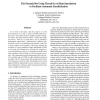33 search results - page 2 / 7 » In Search of Speculative Thread-Level Parallelism |
IPPS
2000
IEEE
13 years 9 months ago
2000
IEEE
Speculative thread-level parallelism has been recently proposed as an alternative source of parallelism that can boost the performance for applications where independent threads a...
HPCA
1998
IEEE
13 years 9 months ago
1998
IEEE
As we look to the future, and the prospect of a billion transistors on a chip, it seems inevitable that microprocessors will exploit having multiple parallel threads. To achieve t...
SBACPAD
2007
IEEE
13 years 11 months ago
2007
IEEE
The necessity of devising novel thread-level speculation (TLS) techniques has become extremely important with the growing acceptance of multi-core architectures by the industry. H...
LCPC
2005
Springer
13 years 10 months ago
2005
Springer
Thread-level speculation (TLS) allows potentially dependent threads to speculatively execute in parallel, thus making it easier for the compiler to extract parallel threads. Howeve...
HPCA
2002
IEEE
14 years 5 months ago
2002
IEEE
Thread-Level Speculation (TLS) allows us to automatically parallelize general-purpose programs by supporting parallel execution of threads that might not actually be independent. ...



